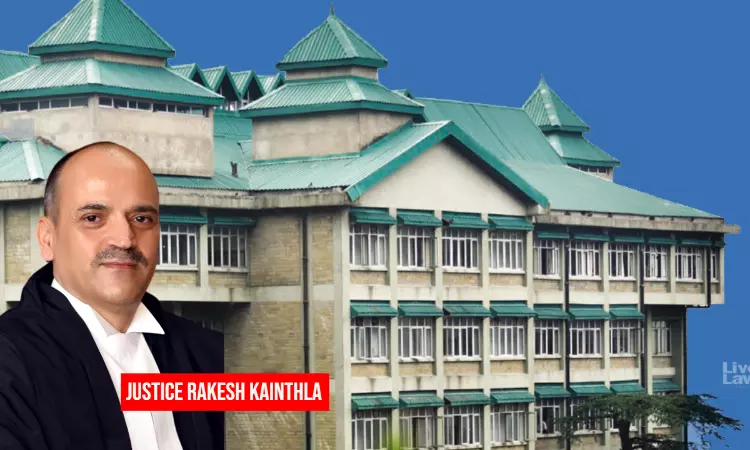- Home
- /
- High Courts
- /
- Himachal Pradesh High Court
- /
- 'Unnatural Sex' With Wife A...
'Unnatural Sex' With Wife A Punishable Offence, Marital Rape Exception Doesn't Apply To S. 377 IPC: Himachal Pradesh High Court
Sparsh Upadhyay
13 May 2025 6:38 PM IST
Himachal Pradesh High Court categorically disagreed with the Uttarakhand High Court's July 2024 judgment, which held that a husband cannot be prosecuted for unnatural sex with his wife under Section 377 of the IPC.
In a significant order, the Himachal Pradesh High Court has recently rejected the contention that there can be no offence punishable under Section 377 of the IPC between the husband and wife. A bench of Justice Rakesh Kainthla said that the declaration of unconstitutionality of Section 377 of IPC by the Supreme Court in the case of Navtej Singh Johar v. Union of India doesn't apply...
In a significant order, the Himachal Pradesh High Court has recently rejected the contention that there can be no offence punishable under Section 377 of the IPC between the husband and wife.
A bench of Justice Rakesh Kainthla said that the declaration of unconstitutionality of Section 377 of IPC by the Supreme Court in the case of Navtej Singh Johar v. Union of India doesn't apply to non-consensual sexual intercourse against the order of nature, even if the act is between a husband and a wife.
“The Hon'ble Supreme Court held in Navtej Singh Johar v. Union of India, (2018) 10 SCC 1 that Section 377 insofar as it criminalises consensual sexual acts between adults is violative of Articles 14, 15, 19 and 21 of the Constitution of India. However, this will not affect non-consensual sexual acts against adults, all acts of carnal intercourse against minors and acts of bestiality,” the bench noted.
Importantly, in its ruling, the Himachal Pradesh High Court has categorically disagreed with the Uttarakhand High Court's July 2024 judgment, which held that a husband cannot be prosecuted for unnatural sex with his wife under Section 377 of the IPC, as the marital rape exception under Section 375 extends to this provision as well.
Terming the Uttarakhand High Court's judgment a “clear case of judicial legislation,” the Himachal Pradesh High Court observed as follows:
“It is difficult to accept the submission and follow the judgment of the Uttarakhand High Court with utmost humility. The Uttarakhand High Court held that an exception to Section 375 of the IPC cannot be taken out from Section 377 of the IPC. This is a clear case of judicial legislation. The legislature has not enacted any exception in section 377, and it is not permissible to incorporate an exception created under section 375 into Section 377 of the IPC by any process of interpretation,” the single Judge remarked. (emphasis supplied)
For context, 'marital rape exception' is found under Section 375 IPC (now Section 63 of BNS) as it provides exception to non-consensual matrimonial sex from the offence of rape.
The Himachal Pradesh High Court was essentially dealing with a plea filed by the Husband and his relatives challenging an FIR against them by the wife (informant) under Section 377, 498-A, 323, 355, 504, 506 and 34 IPC.
It was the case of the petitioners that the matter has now been compromised between the parties, and thus, it was prayed that the petition be allowed and the FIR be quashed.
The Court noted that Section 377 of the IPC is similar to an offence punishable under Section 376 of the IPC, and similar considerations will apply.
It added that since the offence under Section 376 has been held to be heinous and against society, the offence punishable under Section 377 of the IPC is also to be regarded as heinous and against society, which cannot be compromised by the parties, and therefore, the FIR cannot be quashed while exercising inherent jurisdiction under Section 482 of the CrPC.
The single judge also discarded the submission that the allegations under Section 377 IPC were false and were introduced by the informant during the investigation.
The Court said that it cannot go into the truthfulness or otherwise of the allegations made in the complaint while dealing with a Section 482 CrPC plea.
The bench, however, allowed the petition qua offences punishable under Sections 498A, 323, 355, 504, and 506 read with Section 34 of the Indian Penal Code (IPC). It clarified that the matter will proceed for the commission of an offence punishable under Section 377 of the IPC.
Case title - Rajesh Kumar and others vs. State of H.P. and another
Case Citation :
Click Here To Read/Download Order



